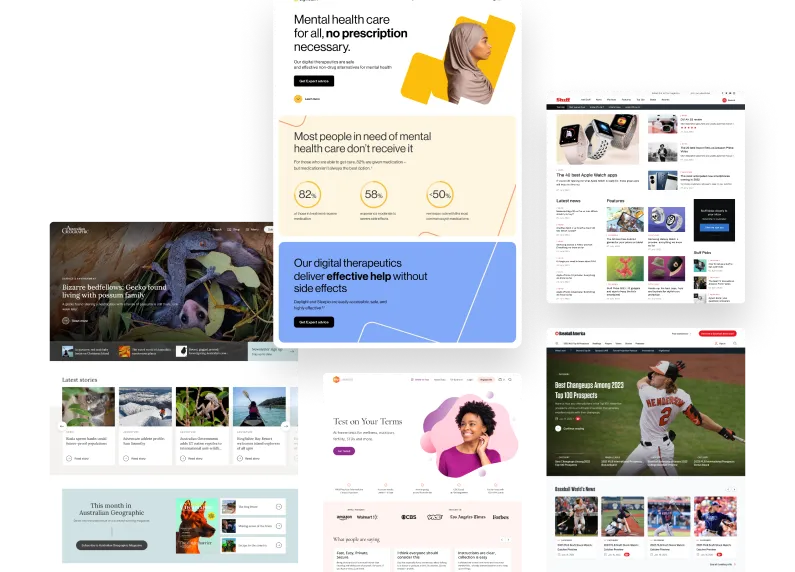2020 was a huge year for WordPress and open source, with three new dot releases, new milestones for open source’s place in the CMS marketplace, and tons more. We can’t ignore the fact that, as terrible as it was, 2020 was a great launchpad into a new decade for WordPress and open source. At XWP, open source runs through our blood. We’re proud of our achievements over the last year. Not only that, but we’re proud of the accomplishments of our clients. Together, we’ve created some world class solutions to help make the Internet work better.
In December of last year, Matt Mullenweg, along with a number of other top industry personnel, live streamed the annual State of the Word (SotW), where we learned what’s on tap for WordPress in the 2021 and beyond. One comment in particular really spoke to us. Sudar Muthu, at the end of his question, asked Matt what the next 17 years of WordPress will look like.
“17 years is such a long time!” And he’s right! 17 years ago, WordPress was a small open-source CMS that had a few blogging sites to its name. In December of 2020, WordPress overtook hand-coded websites (sites with no CMS) as the number one site type online.
With WordPress that much closer to its overall goal of owning 51% of CMS market share, and Sudar’s question about the future of WordPress, we got to thinking: What does the future of WordPress actually look like? What kind of improvements can we expect, and what will the State of the Word be like in another decade?
It Will Be More Accessible
A question that came up time and time again during the 2020 SotW was about accessibility. While WordPress itself is completely open to anyone who wants to take part, there are still barriers to entry that need to be broken down. WordPress is a worldwide community, and that means its ambitions need to match that mentality.
Joe Simpson brought this up in his question: “What is WordPress doing to make its online presence more accessible to everyone?” Well, WordPress and the open source community around it are doing quite a bit. From open-source translation plugins and new language options within the WordPress core to accessible online meetups and code databases, WordPress will no doubt grow as a place where everyone can contribute, no matter their language, location, or experience level.
It Will Continue to Grow
Matt’s never been shy about his goal of achieving 51% of market share when it comes to the CMS marketplace. Since WordPress recently overtook hand-coded sites as the number one site type online, it’s that much closer to achieving Matt’s goal.
But 51% is just the tip of the iceberg. Matt’s big goal for WordPress is “…by 2037, we’ve gotten a vast majority, maybe as close to 100% as we can get, onto open-source software.” This is no small goal, but it’s definitely achievable. If you look at the chart above, you can see that only 10 years ago, WordPress had a meager 13% of market share. It only took 10 years to grow by 27%. In another 10, who knows where we’ll be? But all indicators are pointing up. After all, there are plenty of opportunities for growth.
Blocks Are the Future
Speaking of opportunities for growth, another area Matt expects to see explode in the upcoming decade is the Gutenberg editor. Since its release in 2018, Gutenberg has become the default editor for WordPress, making it easier for anyone and everyone to create high-quality websites for themselves or their business.
“I’d love to see Gutenberg used not just by WordPress, but by all its competitors, as well. By everyone who’s accepting text in a box on the Internet or on native. I’d love them to build on Gutenberg blocks, because that allows us to work together on something that we used to have to rewrite and recreate a million, million times.”
Matt Mullenweg, CEO, Automattic
2020 brought many improvements to the block editor, and the next decade will continue that trend. From full site editing capabilities to a myriad of blocks made available through open-source contributions, the Gutenberg editor shows great promise.
What’s Next for WP and XWP?
What are we most looking forward to in the next decade? A large number of our team members are part of the group that contributes to the WordPress core. We want what’s best for the community and the platform because we’re in it. We help build WordPress and other open-source platforms for ourselves and for our clients because we want to create a better future for the Internet.
We can’t wait to see what the next decade brings, but let’s take on 2021 first. New updates to the WordPress core are coming soon, but the biggest thing we’re looking forward to? In-person events. WordCamps, meetups, and conferences are our lifeblood. Being fully distributed, those are the some of only times we get to see our friends and teammates. 2020 might have made the future seem a little uncertain, but one prediction we can make with 100% certainty is that the next in-person WordCamp US is going to be one heck of a party.


